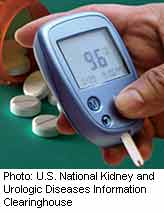- Could Your Grocery Store Meat Be Causing Recurring UTIs?
- Are You Making This Expensive Thermostat Error This Winter?
- Recognizing the Signs of Hypothyroidism
- 10 Strategies to Overcome Insomnia
- Could Artificial Sweeteners Be Aging the Brain Faster?
- Techniques for Soothing Your Nervous System
- Does the Water in Your House Smell Funny? Here’s Why
- Can a Daily Dose of Apple Cider Vinegar Actually Aid Weight Loss?
- 6 Health Beverages That Can Actually Spike Your Blood Sugar
- Treatment Options for Social Anxiety Disorder
High Blood Sugar in Heart Failure Patients May Point to Risk of Early Death


Checking the blood sugar levels of emergency department patients with heart failure can identify those at risk of diabetes, hospitalization and early death, a new study suggests.
This increased risk was true even if patients had blood sugar (glucose) levels within what is considered normal limits, the researchers said.
“Our findings suggest that the measurement of blood sugar levels in all patients arriving at emergency departments with acute heart failure could provide doctors with useful prognostic information and could help to improve outcomes in these patients,” study leader Dr. Douglas Lee, said in a journal news release. Lee is a senior scientist at the Institute for Clinical Evaluative Sciences and an associate professor of medicine at the University of Toronto.
Researchers reviewed data on more than 16,500 seniors treated for acute heart failure. The seniors — aged 70 to 85 — were treated at hospital emergency departments in Ontario, Canada, between 2004 and 2007.
“Among patients without pre-existing diabetes, the majority (51 percent) had blood glucose levels on arrival at hospital that were within ‘normal’ limits but greater than 6.1 millimoles per liter (mmol/L),” Lee said. In the United States, that reading is equivalent to about 110 milligrams per deciliter (mg/dL).
Among patients with no prior diagnosis of diabetes, the risk of death within a month was 26 percent higher among patients with slightly elevated blood sugar levels compared to those with normal blood sugar levels. People whose blood sugar levels were nearly high enough to meet the criteria for a diabetes diagnosis had a 50 percent higher risk of death within a month compared to those with normal blood sugar levels, the researchers reported.
The risk of death from cardiovascular disease was also higher among those who had raised blood sugar readings, even if they were just slightly raised above normal, the study found.
Anyone whose blood sugar levels were above normal had an increased risk of developing diabetes later. And, the higher someone’s hospital blood sugar reading was, the greater the risk of developing type 2 diabetes.
People with pre-existing diabetes were also more likely to die within a month if their blood sugar levels were above 11.1 mmol/L (200 mg/dL) when they arrived at the emergency department. They were also more likely to be hospitalized for diabetes-related complications if their blood sugar levels were much higher than normal, the study found.
People with and without pre-existing diabetes had a greater risk of hospitalization for heart failure or cardiovascular problems if their blood sugar levels were elevated above normal.
“Our results suggest that all such patients should undergo further testing for diabetes before discharge. If the hospital tests show that their fasting blood glucose is not elevated, then they should be monitored subsequently for the development of diabetes as outpatients,” Lee explained.
“It is a rapid, readily available and inexpensive test that could be used to enable doctors to quickly assess a patient’s risk for a wide range of possible outcomes and to suggest appropriate screening strategies that should be put in place,” he concluded.
Results of the study were published online Jan. 7 in the European Heart Journal.
More information
The U.S. National Heart, Lung, and Blood Institute has more about heart failure.
Source: HealthDay
Copyright © 2026 HealthDay. All rights reserved.










